
You are your memories. Think about who you are, what you like, what you don't like. What do you stand for? Who are your friends? What are your favorite foods, movies, music, and books?
Without memories, people cannot work, have a conversation with friends, or learn anything new. In fact, this is what happens in Alzheimer's disease, a progressive condition that damages the brain's ability to form and recall memories. Over time, people with Alzheimer's are forced to live almost entirely in the present tense, losing connection to their past and sense of self. The impact on quality of life — both for them and their families — is profound.
I remember, therefore I am.
When we say we've "forgotten" something, that's often not quite true. In most cases, the information is still stored in our brain — we just can't access it at the moment.
For example, if asked to list all the countries in Latin America, you might name a few but leave some out. Yet if I ask whether Bolivia is one of them, you'd probably recognize that it is, even though you didn't recall it earlier. That shows the memory is still there — it just wasn't retrieved right away.
Most of the time, we don't actually forget; we simply can't recall information. That means that we can find ways to help people retrieve them.
That's exactly what Memory Machines does: help people quickly recall information that's still in their minds but just out of reach.
Former U.S. Secretary of Defense Donald Rumsfeld famously described three categories of knowledge. Known knowns are the things that you plainly know (e.g., I know how to solve differential equations). Known unknowns are the things you know you do not know (e.g., I know I do not understand string theory). Unknown unknowns are the things that you do not even realize that you do not know.The unknown knowns are, by definition, impossible for us to identify or even ask about.
But there is a fourth, often overlooked, yet fundamental category. The unknown knowns. These are what we do know but we can’t recall. The unknown knowns can be resurfaced with the right cues. For example, I do not remember that my customer John has a son. However, perhaps a cue like watching a basketball game on TV triggers my memory that John’s son plays soccer at Johns Hopkins and, furthermore, that John is visiting his son to watch his game next weekend.
Our known knowns are far out numbered by our unknown knowns and unknown unknowns. However, unlike the unknown unknowns, our unknown knowns can be recalled with the right cues, unlocking a vast trove of our memories.
Strictly speaking, all memories are "false" memories. Our memories are not perfect recordings. Memories are stories that we tell ourselves about the past. And every time we recall those memories, we subtly change them, in most cases unconsciously.
It is quite common for a group of people to be in the same event, yet remember it differently. They simply blend their interpretations, emotions and later reflections into what they remember.
The situation is different with machines. Videos or audio recordings can serve as veridic records of what happened.
For the first time in human history, we can now have perfect memories.
The brain, like any other physical device, cannot store infinite information. That said, we do not know what that limit is or how close we ever get to it. Our brains do not store information the way computers do. Memories are highly compressed versions of events.
In computer science, compression algorithms reduce file size by removing redundant data.
Our brains compress data in a much more sophisticated way. Think of a five-hour hike. Instead of storing every rock, tree, or footstep, we keep only the moments that stand out to us — a beautiful view, a meaningful conversation, or a funny comment. In this way, memory is a form of lossy compression: memory keeps what's meaningful and discards the rest.